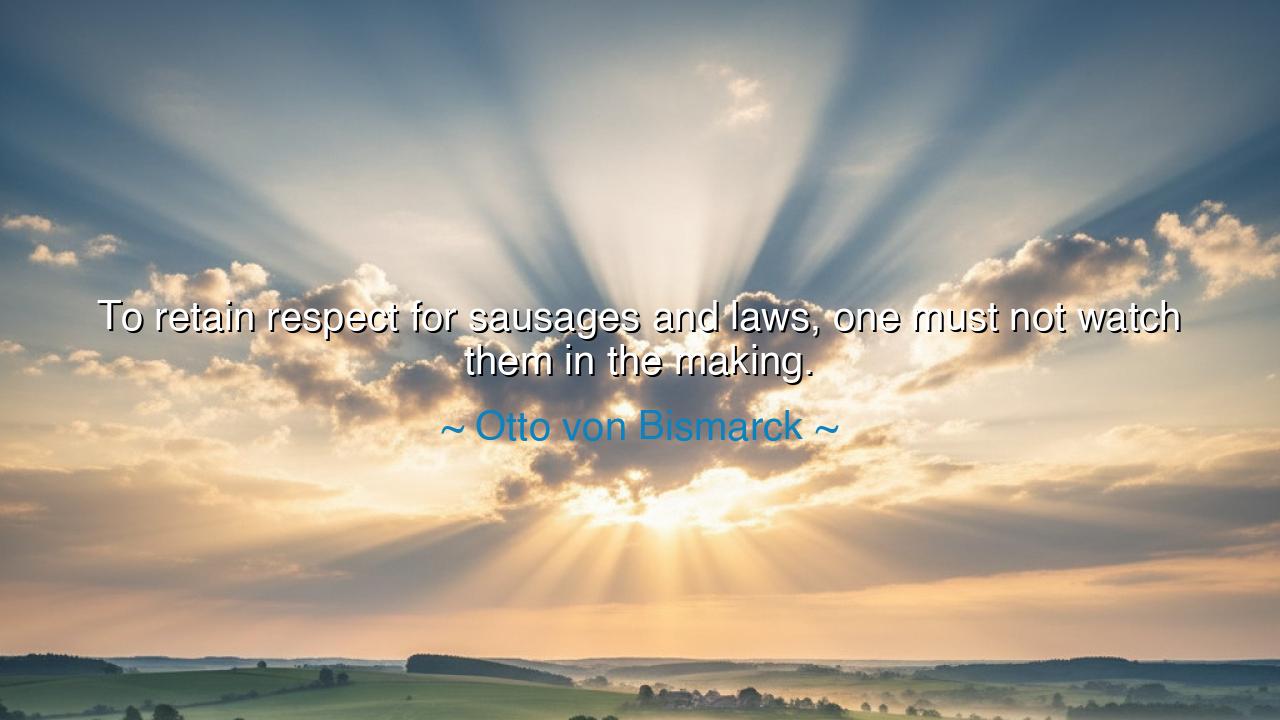
To retain respect for sausages and laws, one must not watch them






"To retain respect for sausages and laws, one must not watch them in the making." These words from Otto von Bismarck are steeped in wisdom and reflect a timeless truth about the nature of both politics and society. Bismarck, a statesman of great stature, understood the complex and often unsavory processes behind the creation of laws and the machinery of governance. In this quote, he highlights a fundamental principle: ignorance, or at least a certain degree of distance, can be essential in maintaining respect for systems and processes that, when viewed up close, might appear messy, inefficient, or morally questionable. Just as one may lose their appetite for sausage if they saw its production, so too might one lose faith in the political system if they fully understood the compromises and struggles inherent in its creation.
In the ancient world, great leaders and thinkers, such as Plato and Aristotle, understood that governance was a complex and often morally ambiguous process. Plato’s Republic, while an idealistic vision of the perfect state, also explored the difficulties and moral challenges that arise in the pursuit of justice. Plato suggested that rulers must be philosopher-kings, not only wise but also capable of navigating the difficult, often messy realities of politics. His philosophy echoed the wisdom in Bismarck’s quote: governance is not always as clean as it appears from the outside. It requires tough decisions, compromises, and an understanding that not all processes are pure in their creation, even if the result is meant to benefit the greater good.
Similarly, Aristotle in his Politics examined the complexities of governance, discussing how laws are shaped by the character of those who make them. He acknowledged that the creation of laws is often a balance between idealism and pragmatism, and while laws aim to reflect the common good, they are often influenced by the personal interests of those in power. This recognition that laws are born from imperfect processes underscores Bismarck’s point: the less one sees the mechanics of their creation, the easier it is to respect and trust them. Just as the taste of sausage may be ruined by knowledge of how it is made, so too may the trust in laws be diminished when one sees the dirty work behind them.
Bismarck’s insight also reflects the practicalities of leadership and decision-making. Throughout history, great leaders—whether political, military, or social—have often faced situations where compromise and maneuvering were necessary to achieve their goals. Consider Winston Churchill during World War II, when he had to make tough decisions that were sometimes morally ambiguous or even controversial. Churchill’s leadership was shaped by a deep understanding of the complexities of war, and while his decisions were often scrutinized, they were made with the weight of the greater good in mind. Like Bismarck, Churchill understood that the public would not always understand or appreciate the difficult choices that leaders must make behind closed doors. And so, leaders must often maintain a certain distance between their actions and the public’s understanding of those actions to preserve their faith in the system.
A more modern parallel can be drawn with the founding fathers of the United States, who, despite their noble ideals of freedom and democracy, engaged in compromises that would be deemed morally questionable today—such as the acceptance of slavery for the sake of unity among the colonies. The writing of laws and the formation of a new government was a process fraught with moral contradictions and difficult choices. While the Constitution itself laid the groundwork for a nation founded on liberty, the realities of creating such a nation were far from pure. Yet, if the public knew the full extent of the compromises and the underhanded deals that were made, it might have been difficult for them to respect the new nation’s ideals. This is where Bismarck’s wisdom comes into play—ignorance of these unsavory realities allowed the new nation to thrive in the face of its contradictions.
The lesson of Bismarck’s words is both pragmatic and philosophical: to live with the systems we have—whether they are governments, businesses, or even relationships—we must maintain a certain distance from the process that creates them. Respect for laws, for systems, and for the things that sustain society is often founded on the ability to look at their outcomes rather than the often unseemly processes through which they come into being. The truths we live by are not always as clean as we might like to believe, and part of living well involves accepting that some things are better left unseen, for the sake of maintaining faith and trust in the larger structures that guide our lives.
In our own lives, we must learn to navigate the tension between understanding the truths behind the things we hold dear and maintaining the faith that allows those things to function effectively. There are times when knowing too much about the processes behind our work, our relationships, or our governments can erode the respect we have for them. Bismarck’s wisdom teaches us that there is a delicate balance between the transparency we seek and the sanctity of the outcomes we hold dear. Let us not be so consumed with the unsavory aspects of creation that we lose sight of the value and purpose of what is built. Sometimes, it is better to allow faith to carry us through, rather than diving too deeply into the mechanics of the making.






AAdministratorAdministrator
Welcome, honored guests. Please leave a comment, we will respond soon